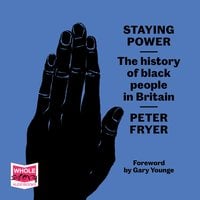
It was a place and a time in which “black” meant “other” and “black” was unquestionably the opposite of “British”. Photograph: Daily Herald Archive/SSPL via Getty Images

Jamaican immigrants arriving at Tilbury Docks in Essex, 22 June 1948 on the Empire Windrush. They felt marked out and unwanted whenever they left the confines of family or community. Many non-white people felt that while it was possible to be in Britain it was much harder to be of Britain. In my childhood, the resistance seemed, to me at least, to come from the opposite direction. In the early 21st century, politicians in Whitehall and researchers in thinktanks fret about the failures of ethnic-minority communities to properly integrate into British society. That scribbled note reiterated the demand that me and my siblings be sent “back”. It is difficult to regard a word as benign when it has been scrawled on to a note, wrapped around a brick and thrown through one’s living-room window in the dead of night, as happened to my family when I was 14.

When, in recent years, I have been assured that such dolls, and the words “golliwog” and “wog”, are in fact harmless and that opposition to them is a symptom of rampant political correctness, I recall another incident. The girl who innocently brought her golliwog doll into our classroom plunged me into a day of humiliation and pain that I still find painful to recall, decades later. One of the worst moments of my unhappy schooling was when, during the run-up to a 1970s Christmas, we were allowed to bring in our favourite toys.

I grew up in a Britain in which there were pictures of golliwogs on jam jars and golliwog dolls alongside the teddy bears in the toy shop windows. I was 17 when the last of the touring blackface minstrel shows finally disappeared, having clung on for a decade performing in fading ballrooms on the decaying piers of Britain’s seaside towns. I have memories of my mother rushing across our living room to change television channels (in the days before remote controls) to avoid her mixed-race children being confronted by grotesque caricatures of themselves on prime-time television. I was eight years old when the BBC finally cancelled The Black and White Minstrel Show. To thousands of younger black and mixed-race Britons who, thankfully, cannot remember those decades, the racism of the 1970s and 1980s and the insecurities it bred in the minds of black people are difficult to imagine or relate to.īut they are powerful memories for my generation.


 0 kommentar(er)
0 kommentar(er)
